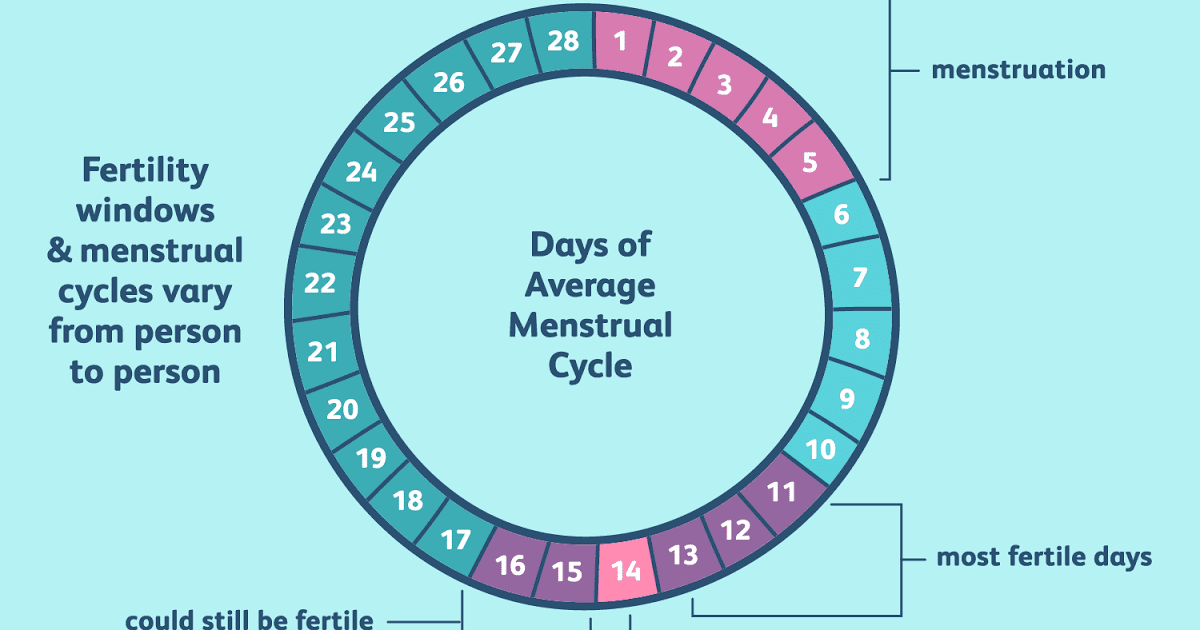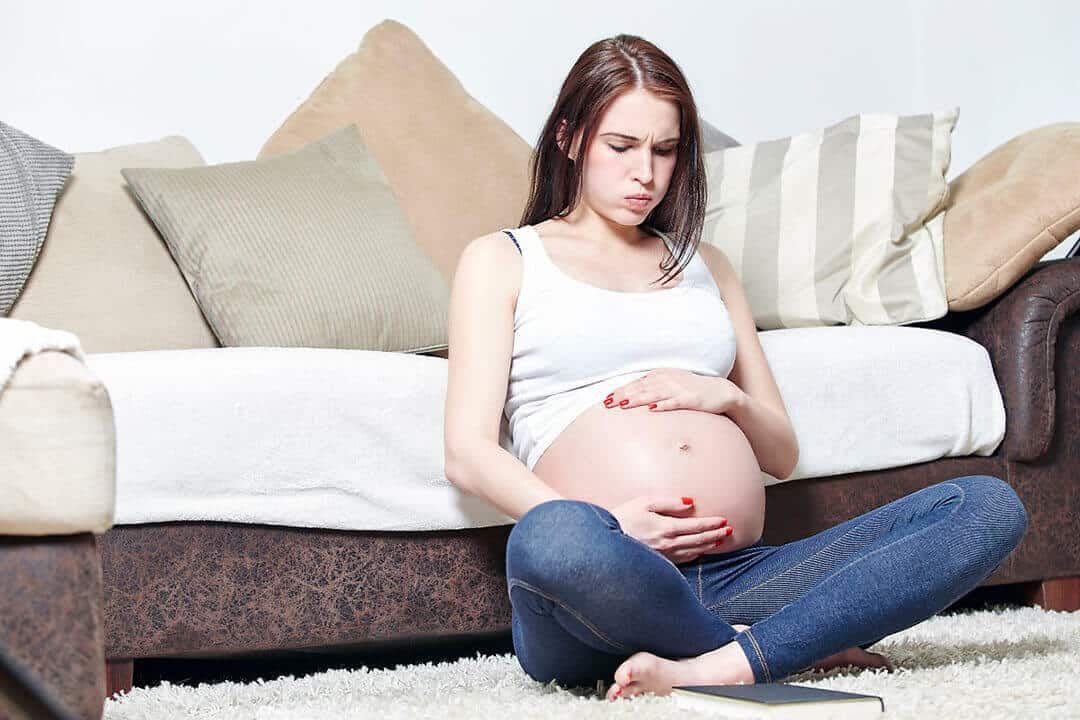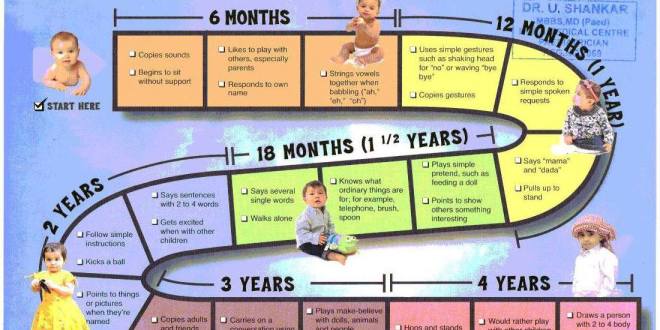How should you sleep when your pregnant
Best Sleeping Positions While Pregnant
The best sleep position during pregnancy is “SOS” (sleep on side) because it provides the best circulation for you and your baby. It also places the least pressure on your veins and internal organs. Sleeping on your left side will increase the amount of blood and nutrients that reach the placenta and your baby. Plus good circulation helps reduce potential swelling, varicose veins in your legs and hemorrhoids.
How Can I Sleep More Comfortably During Pregnancy?
Keep your legs and knees bent, and put a pillow between your legs to relieve the stress on your back.
- If you find that you are having problems with back pain, use the “SOS” position, and try placing a pillow under your abdomen as well.
- If you are experiencing heartburn during the night, you may want to try propping your upper body with pillows.
- In late pregnancy, you may experience shortness of breath. Try lying on your side or propped up with pillows.
These suggestions may not sound completely comfortable, especially if you are used to sleeping on your back or stomach, but try them out. You may find that they work. Keep in mind that you may not stay in one position all night, and rotating positions is fine.
What Sleep Positions During Pregnancy Should I Avoid?
Sleeping on your back: This can cause problems with backaches, breathing, the digestive system, hemorrhoids, low blood pressure and cause a decrease in circulation to your heart and your baby. This is a result of your growing abdomen resting on your intestines and major blood vessels (the aorta and vena cava). You can also develop sleep apnea as you put on weight.
Sleeping on your stomach: When you are farther along in your pregnancy, your breasts become more tender and your abdomen continues to grow, both making sleeping on your tummy uncomfortable. Using a donut-shaped pillow (with a hole in the middle) may help you sleep comfortably on your stomach.
Reasons for your discomfort may include:
During pregnancy, you may find yourself wrestling in bed trying to get comfortable before falling asleep. When you are pregnant your body goes through a variety of changes causing your regular sleeping positions to no longer work for you.
- Increased size of the abdomen
- Back pain
- Heartburn
- Shortness of breath
- Insomnia
More Steps to Sleeping Better While Pregnant
- Limit caffeine. Try not to drink coffee or caffeinated tea after 3 p.m.
- Brink plenty of water. Drink lot of water through out the day, but limit intake a couple of hours before bedtime so you don’t have to wake up and go to the bathroom.
- Exercise for 30 minutes. Exercise helps you sleep better, but don’t exercise within four hours of bedtime.
- Relaxing activities. A warm bath, foot or shoulder massage will help you relax.

- Peaceful bedroom. Keeping your bedroom dark, quiet and cool at night will help to drift off to sleep and stay asleep.
- 7 Discomforts of Pregnancy
- Nighfood Nighttime Ice Cream
- Pregnancy Week 15
Compiled using information from the following sources:
1. Nemours Foundation
https://www.kidshealth.org
1. Your Pregnancy Week by Week Fifth Ed. Curtis, Glade B., OB/GYN, et al. Week 16
Sleeping During Pregnancy (for Parents)
Reviewed by: Larissa Hirsch, MD
en español El sueño durante el embarazo
Why Does Pregnancy Sometimes Make Sleeping Difficult?
When you're pregnant, it can be hard to get a good night’s sleep. As you get bigger, it gets tougher to find a comfortable sleeping position. You may need to pee in the middle of the night. And heartburn can wake you up.
Some women have leg cramps and backaches, especially as they begin carrying more and more weight.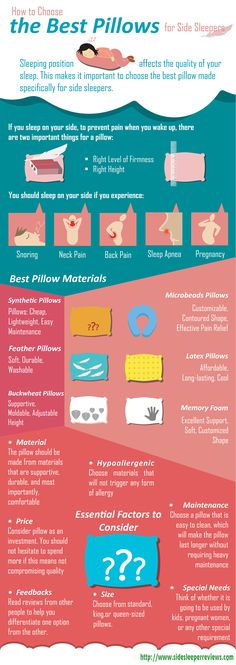 Many pregnant women report that their dreams become more vivid than usual, and some even have nightmares.
Many pregnant women report that their dreams become more vivid than usual, and some even have nightmares.
Stress can interfere with sleep too. Maybe you're worried about your baby's health, anxious about your abilities as a parent, or feeling nervous about the delivery itself. All these feelings are normal, but they might keep you (and your partner) up at night.
How Can I Get a Better Night’s Sleep?
Early in your pregnancy, try to get into the habit of sleeping on your side. Lying on your side with your knees bent is likely to be the most comfortable position as your pregnancy progresses. It also makes your heart's job easier because it keeps the baby's weight from applying pressure to the large vein (called the inferior vena cava) that carries blood back to the heart from your feet and legs.
But don't drive yourself crazy worrying that you might roll over onto your back during the night. Shifting positions is a natural part of sleeping that you can't control.
Try experimenting with pillows to find a comfortable sleeping position. Some women place a pillow under their abdomen or between their legs. Also, using a bunched-up pillow or rolled-up blanket at the small of your back may help to relieve some pressure. In fact, you'll see many "pregnancy pillows" on the market. If you're thinking about buying one, talk with your doctor first about which might work for you.
Over-the-counter sleep aids, including herbal remedies, are not recommended for pregnant women.
Instead, these tips may safely improve your chances of getting a good night's sleep:
- Cut out caffeinated drinks like soda, coffee, and tea from your diet as much as possible. Restrict any intake of them to the morning or early afternoon.
- Avoid drinking a lot of fluids or eating a full meal within a few hours of going to bed. (But make sure that you also get plenty of nutrients and liquids throughout the day.) Some women find it helpful to eat more at breakfast and lunch and then have a smaller dinner.
 If nausea keeps you up, try eating a few crackers before you go to bed.
If nausea keeps you up, try eating a few crackers before you go to bed. - Get into a routine of going to bed and waking up at the same time each day.
- Avoid rigorous exercise right before you go to bed. Instead, do something relaxing, like reading a book or having a warm, caffeine-free drink, such as milk with honey or a cup of herbal tea.
- If a leg cramp awakens you, it may help to press your feet hard against the wall or to stand on the leg. Some women find that stretching their calf muscles before bed helps. Also, make sure that you're getting enough calcium and magnesium in your diet, which can help reduce leg cramps. But don't take any supplements without checking with your doctor.
- Take a yoga class or learn other relaxation techniques to help you unwind after a busy day. (Be sure to discuss any new activity or fitness regimen with your doctor first.)
- If fear and anxiety are keeping you awake, consider enrolling in a childbirth class or parenting class.
 More knowledge and the company of other pregnant women may help to ease the fears that keep you awake at night.
More knowledge and the company of other pregnant women may help to ease the fears that keep you awake at night.
What If I Still Can't Sleep?
Of course, there will be times when you just can't sleep. Instead of tossing and turning, worrying that you're not asleep, and counting the hours until your alarm clock will go off, get up and do something calm: read a book, listen to music, or look at a magazine. Eventually, you'll probably feel tired enough to get back to sleep.
And if possible, take short naps (30–60 minutes) during the day. Naps can help you have energy to get through the day and give your body the rest it needs.
Reviewed by: Larissa Hirsch, MD
Date reviewed: May 2022
How to sleep during pregnancy
It is difficult to overestimate the role of sleep in the life of every person. A complete healthy rest allows you to fully restore the functioning of the nervous system, relieve stress, improve performance and increase activity. Chronic sleep deprivation is the cause of many diseases. What can we say about a woman who is at the stage of bearing a baby. During this period, more than ever, she needs a healthy, long and full sleep. However, unfortunately, it is during this period that one can only dream of a restful sleep.
Chronic sleep deprivation is the cause of many diseases. What can we say about a woman who is at the stage of bearing a baby. During this period, more than ever, she needs a healthy, long and full sleep. However, unfortunately, it is during this period that one can only dream of a restful sleep.
As soon as a woman finds out about her new position, she has to give up a lot for the sake of the health of her unborn baby. And you need to give up not only bad habits: alcohol, cigarettes, coffee, but also from a comfortable sleep.
The cause of insomnia can be :
- Anxiety;
- Frequent urination;
- Fears and phobias before a new stage of one's life;
- Nervousness and irritability;
- Digestive disorder;
- Toxicosis;
- Physical indisposition;
- Uncomfortable posture.
During the period of bearing a child, the female body experiences an extraordinary load, especially in the last trimester. The need for more sleep increases, because the body expends much more energy. Therefore, healthy sleep and pregnancy are inextricably linked.
The need for more sleep increases, because the body expends much more energy. Therefore, healthy sleep and pregnancy are inextricably linked.
As soon as a woman finds out about her new position, she has to give up a lot for the sake of the health of her unborn baby. And you need to give up not only bad habits: alcohol, cigarettes, coffee, but also from a comfortable sleep.
Let's try to figure out how to sleep during pregnancy, so as not only not to harm the health of your unborn baby, but to sleep well.
Looking for a comfortable sleeping position
Each person has his own favorite position, in which it is easy to fall asleep and sleep. Many do not imagine a comfortable rest on their backs, accustomed to sleeping on their stomachs. This habit will have to be sacrificed, as it is unsafe for the normal development of the fetus. If in the first three months of pregnancy a woman can still sleep in the position in which she is used to and feels comfortable, then after the first trimester the growing belly will not allow her to lie safely in this position.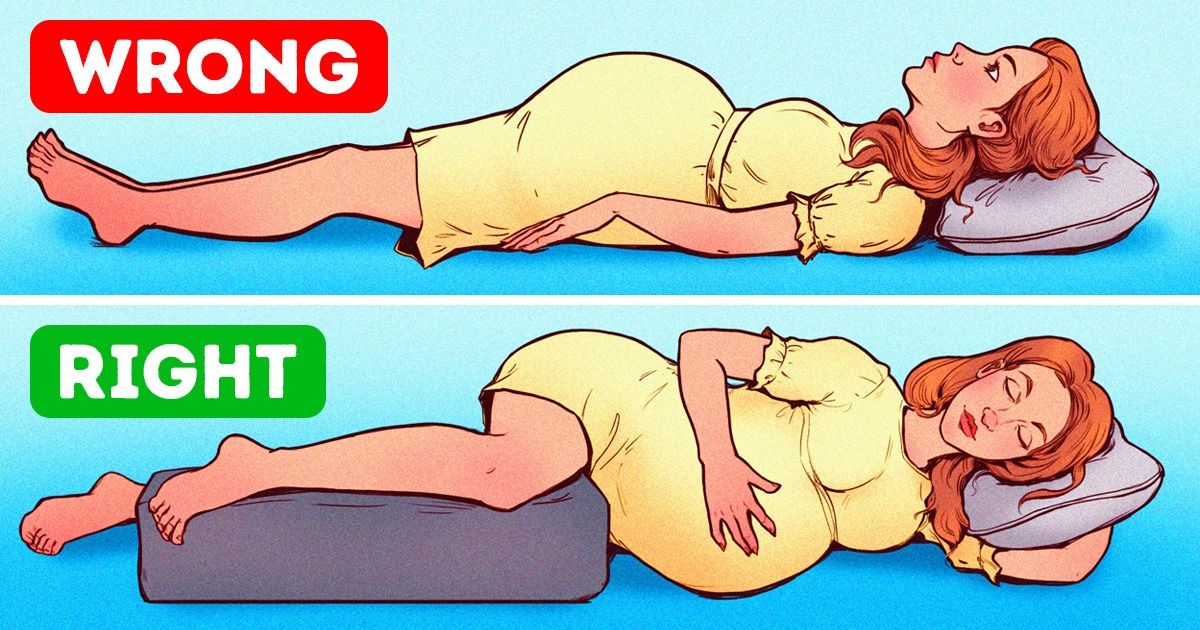 Despite the natural protection of the baby in the form of amniotic fluid, there is a high probability of injuring the baby in a dream, squeezing it. But what is the right way to sleep during pregnancy?
Despite the natural protection of the baby in the form of amniotic fluid, there is a high probability of injuring the baby in a dream, squeezing it. But what is the right way to sleep during pregnancy?
Back position
Even if you are used to sleeping in a Spartan position, on your back, with your arms spread wide, from the 28th week you will have to radically change your lifestyle. The fact is that as the fetus grows, the load on the intestines and vena cava will increase significantly, blocking the access of oxygen to the baby.
As soon as a woman finds out about her new position, she has to give up a lot for the sake of the health of her unborn baby. And you need to give up not only bad habits: alcohol, cigarettes, coffee, but also from a comfortable sleep.
If you sleep on your back during pregnancy, you may experience the following problems:
- Dizziness;
- Nausea;
- Convulsions;
- Numb limbs;
- Pressure reduction;
- Hemorrhoids;
- Heaviness of breathing.

If you feel these symptoms or the baby gives persistent signals, you need to urgently change your position, so squeezing the vena cava is fraught not only with poor health for the mother, but also with a lack of oxygen supply to the fetus.
Stomach position
One of the most beloved positions for many people, which allows you to quickly fall asleep while hugging a pillow. Many women, as soon as they find out about the change in their lives, are interested in the question, is it possible to sleep on your stomach during pregnancy? Doctors recommend abandoning this position already in the first weeks, even before the enlarged belly makes it impossible to fall asleep peacefully.
If you are afraid during sleep, without controlling your movements, to arbitrarily roll over on your stomach, you can put a large pillow that does not allow you to change position.
Side position
In order to normalize your sleep and not harm the health of the baby, experts recommend sleeping on your side during pregnancy. And if at first this option seems unacceptable to many, after the second trimester, lying on your side is the only possible one. But here the question arises, on which side to sleep in order to ensure the safety of the fetus?
And if at first this option seems unacceptable to many, after the second trimester, lying on your side is the only possible one. But here the question arises, on which side to sleep in order to ensure the safety of the fetus?
Sleeping on the right side can cause squeezing of the kidney, which can have dire consequences. The ideal posture is lying on the left side. Thus, you not only do not injure the unborn baby, but also improve blood flow along with oxygen to the placenta.
But one should not ignore the individual characteristics of each organism and the position of the fetus in the uterus. When the baby is in a transverse position, choose the side where the baby's head is. And with a breech presentation, doctors recommend changing the position several times a night.
If you still cannot improve your sleep, you feel unwell and you are tormented by insomnia, then it is better to consult a specialist. A good gynecologist will analyze the situation and help solve the problem.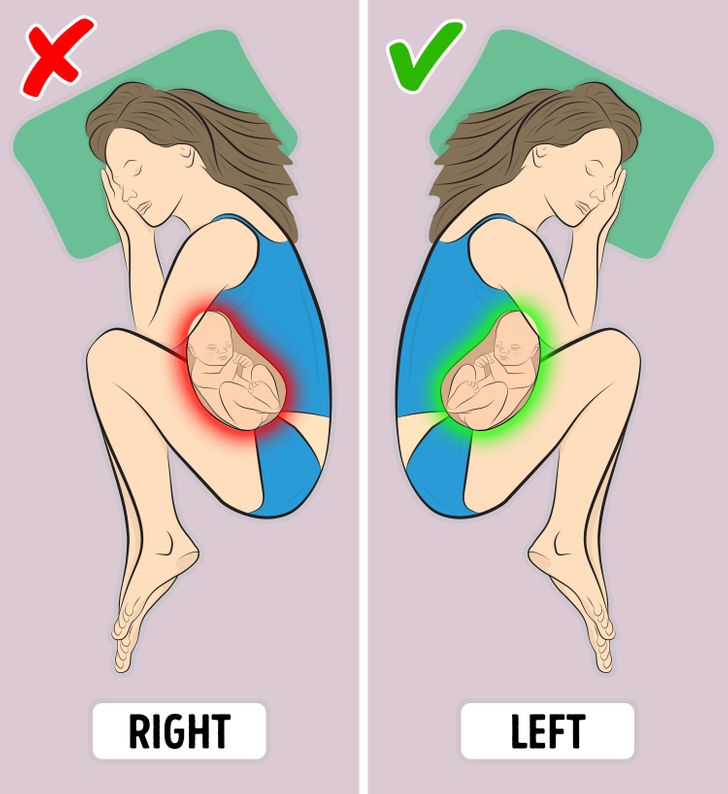 If necessary, he will prescribe a safe sedative that stabilizes the emotional state and helps to fall asleep calmly, resting and restoring the nervous system in a dream.
If necessary, he will prescribe a safe sedative that stabilizes the emotional state and helps to fall asleep calmly, resting and restoring the nervous system in a dream.
Help pillow
Fortunately, now modern manufacturers help women survive the pregnancy period with great comfort by offering special pillows. They are made taking into account the physiological characteristics of a woman in this period and allow you to find a comfortable position for relaxation.
You can buy two pillows and put one under your stomach and the other under your knees, looking for your best option. And you can buy a long banana-shaped pillow, which allows you to throw your leg on it while sleeping, which improves well-being and relieves the main load from the lower back and abdomen. Already in the last weeks of pregnancy, when the growing belly does not allow you to breathe normally, the pillow will allow you to take a comfortable half-sitting position.
Remember that pregnancy is your opportunity to gain strength and fully relax before the most crucial period in your life. Childbirth and the first weeks of caring for your baby will require a lot of energy from you, so good luck and sound sleep!
Childbirth and the first weeks of caring for your baby will require a lot of energy from you, so good luck and sound sleep!
Pregnancy and sleep - recommendations from an obstetrician-gynecologist
Contents of the page
Pregnancy is a special condition that affects the entire body. Hormonal changes, weight gain, fetal growth - all this increases energy costs. To make up for them, it is very important for the expectant mother to observe the rest regimen and, first of all, she needs a good sleep.
The duration of sleep should be at least 8-8.5 hours, of which 1 hour should be for daytime rest. At the same time, you need to go to bed at the same time every day. For a good restful sleep, you need to find a comfortable position.
Right side or left side? How to choose the best sleeping position.
If in the first 3 months of pregnancy a woman can still sleep in the position in which she is used to and feels comfortable, then after the first trimester she should not sleep on her stomach. Indeed, after 11-12 weeks, the uterus extends beyond the small pelvis. And starting from 15-16 weeks, it is necessary to abandon the position on the back, since the growing uterus compresses the inferior vena cava that passes behind it, which negatively affects the condition of the mother and child.
Indeed, after 11-12 weeks, the uterus extends beyond the small pelvis. And starting from 15-16 weeks, it is necessary to abandon the position on the back, since the growing uterus compresses the inferior vena cava that passes behind it, which negatively affects the condition of the mother and child.
- The most comfortable postures are on the right and left sides. You can sleep on your left side in any trimester. On the right side - this position is suitable as a change position at the end of the second and third trimesters.
- From 25 weeks on, a pillow can be placed under the abdomen for comfortable sleep. There are special pillows for pregnant women, which are made taking into account the physiological characteristics of a woman in this period and allow her to find a comfortable position for relaxation. In the last weeks of pregnancy, the pillow will allow you to take a comfortable half-sitting position. For better sleep, you should not eat immediately before bedtime, you should not engage in intense mental activity, watch TV.

- Soft, calm and pleasant music will help you relax and get ready for a night's rest. Useful before going to bed walking in the fresh air, a warm shower 20-30 minutes before bedtime, airing the bedroom. Keep the humidity in the sleeping area at least 50%.
Why do sleep disorders occur? What to do?
Changes in a woman's body that occur in a woman's body during pregnancy, physical discomfort and emotional stress, often lead to sleep disturbances. During this period, falling asleep, waking up in the middle of the night can be difficult. Sleep research shows that 9out of 10 pregnant women experience insomnia.
Why is this happening?
- In the first months after conception, the level of progesterone rises sharply, which results in constant feelings of drowsiness, as well as frequent urination, making it difficult to fall asleep and disturbing night sleep.
In order to cope with this, it is necessary to reduce the amount of liquid consumed in the evenings. It is better to replenish the water balance in the morning.
It is better to replenish the water balance in the morning.
- Another factor that disturbs sleep can be nausea. Due to the soreness of the mammary glands during this period, it is also difficult for a woman to find a comfortable position for sleeping.
- If you can't get enough sleep at night, you should definitely rest during the day. In the second trimester of pregnancy, the expectant mother usually feels better. And in recent months, the quality of sleep has been deteriorating. She falls asleep worse, wakes up more often at night.
Most often, sleep disorders are physiological: increased weight and a grown belly make it difficult to find a comfortable position; fetal movement; frequent nighttime urge to urinate; heartburn; leg cramps. Nervous tension, fear of upcoming changes, anxiety for the child, experience before childbirth are psychological reasons that most often deprive a woman of sleep.
How to deal with insomnia?
- Maintain good sleep hygiene - create optimal conditions for falling asleep, close the windows, choose a comfortable mattress, and also do not spend time in bed during which you are awake.

- During the day, avoid overexertion, because fatigue does not always lead to sound sleep.
- Try to discuss your fears with loved ones, a psychologist or a doctor.
- During the day, perform simple physical exercises, depending on the duration of pregnancy and health, take a walk.
- Avoid late meals.
- Take a warm shower before bed.
- Try to drink less in the evening. Before going to bed, it is recommended to drink a cup of warm milk, because it contains tryptophan, a mild natural sleeping pill.
- Foot and neck massage will give you the opportunity to relax before going to bed. The bedroom should be cool.
- Use special pillows for pregnant women, put them under the side, under the neck, clamp between the legs.
- After consultation with your doctor, you can take magnesium-containing drugs.
Under no circumstances should you take sleeping pills yourself. The decision to take sleeping pills can only be taken by your obstetrician-gynecologist! Taking potent sleeping pills, sedatives can adversely affect the formation of the fetal nervous system.
